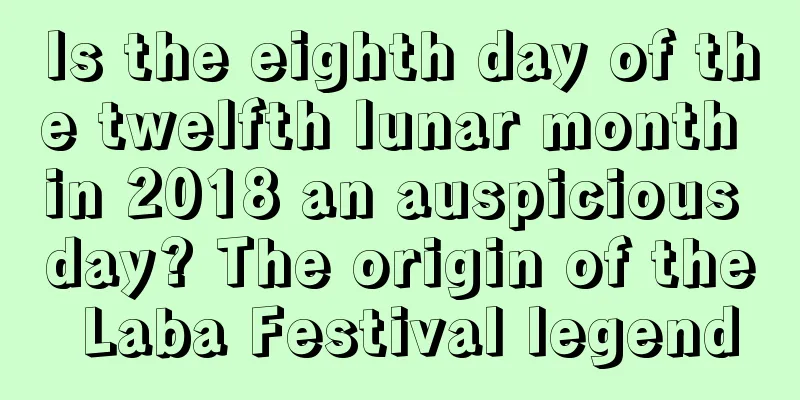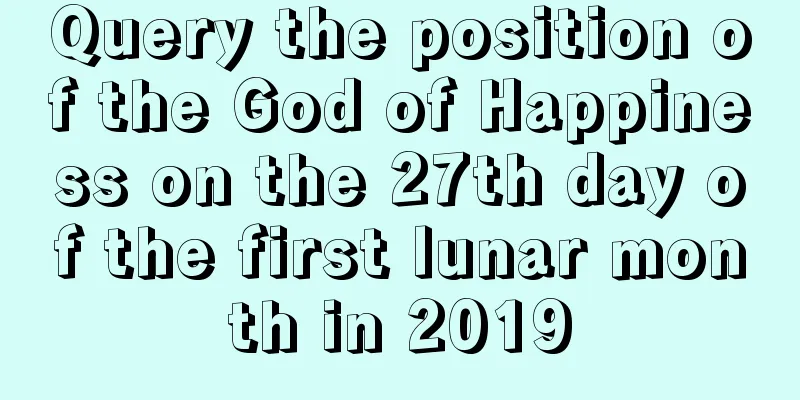Is the eighth day of the twelfth lunar month in 2018 an auspicious day? The origin of the Laba Festival legend

Is the eighth day of the twelfth lunar month in 2018 an auspicious day? Is this day auspicious or not? Qinglong, Tiande, Yutang, Siming, Mingtang and Jinkui are called the Six Yellow Roads. The so-called auspicious days are the days when these six gods are present. Let’s learn about the special topic of December of the lunar calendar in 2018 on Shuimoxiansheng.com.Is the eighth day of the twelfth lunar month in 2018 an auspicious day?December 8, 2018 (Lunar calendar)January 13, 2019, Sunday, Capricorn (solar calendar) 【Today’s lunar calendar is suitable】 Pray for blessings, get married, move, bring in wealth, move into a new home, install a bed and make a stove, accept marriage proposals, build houses, fast and offer sacrifices, take up a post, seek offspring, erect pillars, raise beams, plant crops, bring in livestock, catch animals, and go to school. [Today’s taboos in the almanac] Repair graves and bury, open warehouses and start drilling, travel, meridians and break ground, open the market, Six Yao: win first, twelve gods take over the position, god on duty: Qinglong (zodiac day) On the eighth day of the twelfth lunar month in 2018, the god on duty is the Azure Dragon. It is an auspicious day and also a traditional Chinese folk festival, Laba Festival. What is Laba Festival?Today is the eighth day of the twelfth lunar month, commonly known as Laba Festival. Since ancient times, Laba has been a sacrificial ceremony for worshiping ancestors and gods (including door gods, household gods, house gods, kitchen gods, and well gods) to pray for a good harvest and good luck. According to the "Book of Rites: Suburban Sacrifices", the La Festival is "in the twelfth month of the year, when all things are gathered together and offered a feast." The La Day was called "Jiaping" in the Xia Dynasty, "Qingsi" in the Shang Dynasty and "Dala" in the Zhou Dynasty; because it was held in December, that month was called the La Month and the day of the La Festival was called the La Day. In the pre-Qin period, Laba Festival was on the third Xu day after the winter solstice. Later, when Buddhism was introduced, in order to expand its influence in the local area, it attached to traditional culture and designated Laba Festival as the day of Buddha's enlightenment. Later, as Buddhism became popular, the Buddha's Enlightenment Day was merged with the La Festival, and it was called the "Dharma Treasure Festival" in the Buddhist field. It was not until the Northern and Southern Dynasties that it was fixed on the eighth day of the twelfth lunar month.The origin and legend of Laba Festival:1. Laba Festival is the eighth day of the twelfth lunar month. It originated in the late Yuan Dynasty and early Ming Dynasty. It is said that when Zhu Yuanzhang was imprisoned and suffering, it was a cold day. Zhu Yuanzhang, who was cold and hungry, actually dug out some red beans, rice, red dates and seven or eight kinds of grains from the rat hole in the prison. Zhu Yuanzhang cooked these things into porridge. Because that day was the eighth day of the twelfth lunar month, Zhu Yuanzhang named this pot of multi-grain porridge "Laba porridge". Enjoyed a delicious meal. Later, Zhu Yuanzhang pacified the world and became the emperor. In order to commemorate that special day in prison, he designated that day as Laba Festival and officially named the multi-grain porridge he ate that day as Laba porridge.2. The founder of Buddhism, Sakyamuni, was originally the son of King Suddhodana of Kapilavastu in northern ancient India (in present-day Nepal). Seeing that all living beings were suffering from birth, old age, sickness and death, and being dissatisfied with the theocratic rule of the Brahmins at the time, he gave up the throne and became a monk. He achieved nothing at first, but after six years of asceticism, on the eighth day of the twelfth lunar month, he attained enlightenment under the Bodhi tree and became a Buddha. During these six years of asceticism, he only ate one grain of hemp and one grain of rice every day. Later generations did not forget the suffering he endured, and ate porridge on the eighth day of the twelfth lunar month every year to commemorate him. "Laba" became the "Buddha's Enlightenment Day". "Laba" is a grand festival in Buddhism. Before liberation, Buddhist temples across the country held Buddha bathing ceremonies and chanting sessions, and imitated the legend of the shepherdess offering gruel to Sakyamuni before he attained enlightenment. They cooked porridge with fragrant grains and fruits to offer to the Buddha, which was called "Laba porridge." Laba porridge was given to disciples and believers, and it later became a folk custom. It is said that before the eighth day of the twelfth lunar month, monks in some temples would hold bowls and beg for alms on the streets. They would cook the collected rice, chestnuts, dates, nuts and other ingredients into Laba porridge and distribute it to the poor. It is said that after eating it one can get the blessing of Buddha, so the poor call it "Buddha porridge". Historical records of Laba Festival:Regardless of the origin of the legend, Laba Festival is a special festival in China. There is a folk saying that "after Laba Festival, it is the New Year", so Laba porridge is indispensable on this day. In the Southern Song Dynasty, Lu You wrote in his poem "Walking to West Village on December 8th": "The breeze in the twelfth month is gentle and the feeling of spring has arrived. From time to time I take a walk and visit my neighbors. There is a hazy smoke from the grass behind the wooden door and there are many cow tracks by the wild water. Many diseases require only medicine, and those who do not take any medicine are idlers. Today, people are sharing Buddha porridge, which makes the festival items in the river village seem even newer." This shows that Laba Festival was already a very popular festival in the Southern Song Dynasty. "Shuowen Jiezi" records: "On the third Xu day after the winter solstice, sacrifices are offered to all gods." It can be seen that the third Xu day after the winter solstice was once the La Day. Later, due to the intervention of Buddhism, the La Day was changed to the eighth day of the twelfth lunar month, and it has become a custom since then. |
<<: The sixth day of the twelfth lunar month in 2018 is a good day?
Recommend
The lunar calendar for July 17, 2019, is it a good day?
The Yellow Calendar is also commonly known as &qu...
Query the position of the God of Happiness on November 15, 2018. Where is it?
Want to know more about the days in November of t...
Is it possible to move into a new house on September 24th of the lunar calendar in 2020?
Is it possible to move into a new house on Septem...
What is the zodiac sign of people born on Cold Clothes Festival in 2019?
What is the zodiac sign of people born on Cold Clo...
Can’t we give apples on Christmas Eve? What's the saying about giving gifts on Christmas Eve?
Christmas Eve arrived on a warm winter night. Want...
Is the sixth day of the third lunar month in 2022 a good day to propose? Is it an auspicious day?
The third month of the lunar calendar is known as ...
What are the customs on the sixth day of the Lunar New Year? What day is the sixth day of the Lunar New Year?
China has a profound historical and cultural herit...
Is it good to be born on Dragon Boat Festival if you are a rooster? What is the personality of Gemini Rooster?
Introduction: People in ancient my country believe...
What are the traditional customs on the 29th day of the twelfth lunar month in 2019? Check the auspiciousness and inauspiciousness of today's time!
Introduction: There are many traditional festivals...
How long after the beginning of winter does it start to get cold? Is the weather still hot after the beginning of winter?
As the first solar term of winter among the twenty...
How many days before Qingming Festival in 2021 is it not possible to visit graves? Introduction to the time of tomb sweeping for new and old graves
The choice of time for tomb sweeping is also very ...
How to find the direction of the God of Happiness on the tenth day of the fourth lunar month in 2017?
Introduction: The worship of the God of Joy is ver...
Is November 16th of the lunar calendar in 2021 suitable for moving house? Is it a good day?
The eleventh month of the lunar calendar belongs t...
Can we say "Happy Children's Day" on June 1st?
Everyone knows that Children's Day is a holida...
Which direction is the God of Happiness on March 19th of the lunar calendar in 2020?
The lunar calendar is different for different day...









